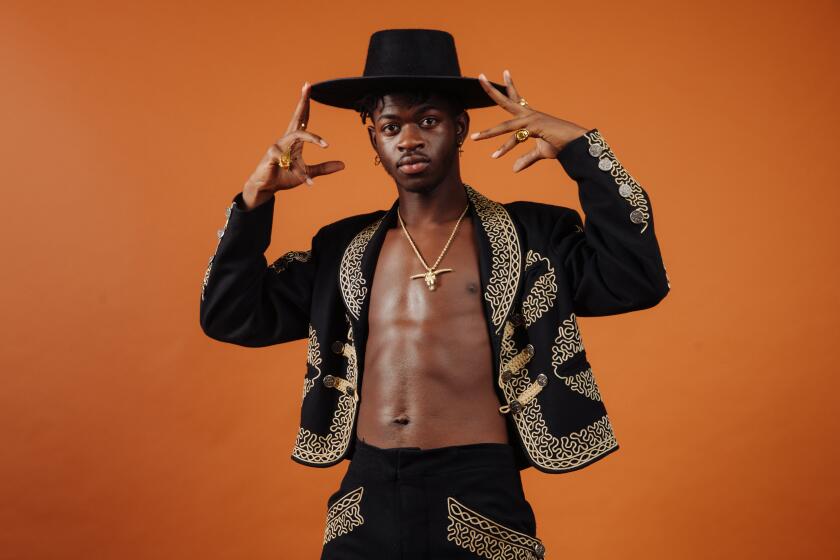Not just Juvenile, he’s also versatile
- Share via
Juvenile
“Reality Check” (Atlantic)
For the record:
12:00 a.m. March 15, 2006 For The Record
Los Angeles Times Wednesday March 15, 2006 Home Edition Main News Part A Page 2 National Desk 0 inches; 29 words Type of Material: Correction
Album label -- A review in Saturday’s Calendar of Little Willies’ album “The Little Willies” listed the record label as Lost Highway. The album is released on Milking Bull/EMI.
* * * 1/2
This clever, gangster-edged New Orleans rapper was the one who gave Cash Money Records its national breakthrough in the late 1990s with the hits “Ha” and “Back That ... Up,” among others.
After leaving the label in a bitter financial dispute, Juvenile returns with his muscular seventh studio album, one of his best. He sprinkles a few blows at Cash Money head Baby, a.k.a. Birdman, throughout the 19-cut collection, but other than that, “Reality Check” features the high-octane mix of dance tunes, gangster declarations and sex-centered songs that have been a staple of Juvenile’s best work.
The production of longtime collaborator Mannie Fresh, as well as Scott Storch and Cool & Dre, plays an important role on “Reality Check,” as it gives Juvenile an enviable sonic backdrop on nearly every song.
A hyperactive ode to his flashiness (“Way I Be Leanin’,” featuring Mike Jones), a brassy, revved-up Katrina-aftermath discourse (“Get Ya Hustle On”) and a sensuous, guitar-driven salute to strippers (“Rodeo”) display Juvenile’s ability to deliver quality songs on a variety of topics over a wide range of beats. It’s a reality that rap would do well to achieve more often.
-- Soren Baker
Norah Jones tackles Bob Wills
Little Willies
“The Little Willies”
(Lost Highway)
* * 1/2
The idea of the Little Willies certainly sounds promising: After two stellar collections of tastefully smoldering adult pop, multiple Grammy-winner Norah Jones returns to the music she grew up with in Texas in an outing with her country music-loving pals.
Alas, Jones stumbles for the first time with this inconsistently rewarding stab at traditional western swing and country blues. It would be clear that Bob Wills is the spiritual godfather here, even if this collection didn’t open with his bouncy hit “Roly Poly.” There’s a sprightly energy at work, but rarely do the performances rise above earnest competence.
That’s a surprise given the bluesy depth she brought to Hank Williams’ “Cold Cold Heart” on her debut album and to Gram Parsons’ “She” in concert. The performances here, however, feel more like first run-throughs during living-room sessions that have been ushered onto CD too hastily.
Jones shares singing duties with Richard Julian, who brings a low-key, less-smoky Lyle Lovett quality to his vocals, but the only time things really catch fire is when Jones turns torchy, as in Elvis’ 1956 hit “Love Me” and Willie Nelson’s “Nightlife.” The band’s name is partly a homage to Nelson, but what this outfit needs is to spend some time on the road again, musically living together awhile before stepping into another studio.
-- Randy Lewis
Gilmour counts his blessings
David Gilmour
“On an Island”
(Columbia)
***
Gilmour’s island is not the machine-age existential exile he’s helped map in his 38 years with Pink Floyd. It’s the love-filled retreat of hearth and home. Co-written with his wife, journalist and author Polly Samson, his first solo album since 1984 is a sentimental ode to their family life.
“I need no blessings, but I’m counting mine,” he sings in his familiar, understated voice in the light, bluesy “This Heaven,” painting a picture of the couple and kids around the dinner table. The mood stands through most of the songs (even several instrumentals), concluding with the arm-in-arm day in the countryside of “Where We Start.”
Musically, “Island” leans to the genteel side, but is filled with longtime Gilmour musical hallmarks -- his majestic yet rarely showy guitar lines, lots of minor 7th chords -- with sympathetic orchestral settings on some pieces by Polish composer Zbigniew Preisner and co-production by Roxy Music’s Phil Manzanera.
As usual with music born of contentment, there’s little in the way of gripping tension. But the warmly personal tone is pleasantly affecting. Comfortable, not numb.
-- Steve Hochman
Run-less DMC stumbles as soloist
DMC
“Checks Thugs and Rock-N-Roll” (RomenMpire/Rags 2 Riches)
* 1/2
With a booming voice and the benefit of some of the most muscular beats in rap history, DMC helped give rap a crossover punch in the mid 1980s as one-third of Run-DMC. But a loss of his vocal might (his voice has been reduced to a shaky tone) and a disillusionment with both rap’s direction and his group lead to DMC being virtually a nonexistent factor on Run-DMC’s last album, 2001’s disappointing, uneven “Crown Royal.”
On his first solo album, DMC adopts a folksy musical and lyrical approach in which he sounds decidedly out of step with both the rap he helped popularize and the rock he seems to so admire. DMC wrestles with his frustration, his doubt and his feelings of helplessness, but his tunes often lack the flair, emotional depth and musical heft to make them enjoyable.
His reinterpretations of Bob Dylan’s “All Along the Watchtower” on “Watchtower” and Harry Chapin’s “Cat’s in the Cradle” on “Just Like Me” have an unprofessional, demo-like feel and are riddled with sophomoric rhymes. Fellow old school rap icon Doug E. Fresh brings some needed charisma to “Lovey Dovey” but, unfortunately, for one of the few times in his career, DMC sounds more like an amateur than a trendsetter.
-- S.B.
More to Read
The biggest entertainment stories
Get our big stories about Hollywood, film, television, music, arts, culture and more right in your inbox as soon as they publish.
You may occasionally receive promotional content from the Los Angeles Times.










